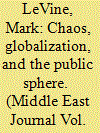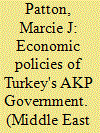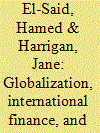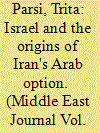| Srl | Item |
| 1 |
ID:
072661


|
|
|
|
|
| Publication |
2006.
|
| Summary/Abstract |
Much of the literature on the contemporary Middle East explores the relationship of strong, authoritarian states with Islamist groups; the professional literature also has examined the role of strong societies with weak states. There has been less study of the role of the various players in weak states with weak societies. This article examines the cases of Palestine and Iraq, two societies undergoing occupation and with weak state structures, and the role of Islamist and other movements within them.
|
|
|
|
|
|
|
|
|
|
|
|
|
|
|
|
| 2 |
ID:
072663


|
|
|
|
|
| Publication |
2006.
|
| Summary/Abstract |
How can we account for the priority that Turkey's "Islam-sensitive" government has placed on adhering to the IMF's prescriptions for macroeconomic stability and fiscal restraint in lieu of its electoral promises to pursue a justice-oriented social agenda and aggressively tackle problems of poverty and unemployment? In this article this question is answered by analyzing the challenges posed by international factors (debt sustainability, pressures by the IMF and the EU), as well as domestic factors (the Justice and Development Party's (AKP) own unpreparedness, oppositional tactics by the secularist establishment) that have shaped the AKP government's economic policies.
|
|
|
|
|
|
|
|
|
|
|
|
|
|
|
|
| 3 |
ID:
072660


|
|
|
|
|
| Publication |
2006.
|
| Summary/Abstract |
This article looks at one important aspect of globalization in the Arab World, namely the provision of international finance by the US, the International Monetary Fund (IMF), and the World Bank in support of economic liberalization programs. This flow of international finance has been partly determined by geopolitical factors and in some countries has resulted in a decline in state provision of social welfare, increased poverty, and increased inequality. Not only has this form of globalization been increasingly challenged by Islamist groups, but many such groups have moved in to provide social capital and fill the welfare gap created by the gradual withdrawal of the state from socio-economic affairs. Globalization has thus strengthened the hand of political Islam and undermined the political legitimacy of incumbent regimes.
|
|
|
|
|
|
|
|
|
|
|
|
|
|
|
|
| 4 |
ID:
072662


|
|
|
|
|
| Publication |
2006.
|
| Summary/Abstract |
This article argues that Iran's "Arab option" - the Arab and pro-Palestinian tilt in Iran's foreign policy - did not emerge out of the ideological musings of Iran's Islamic revolutionaries, but out of Iran's new-found position of preeminence in the later years of the Shah's rule. The sustainability of Iran's regional leadership required Arab acceptance and support, which could only be won through a pro-Arab orientation in Iran's foreign policy.
|
|
|
|
|
|
|
|
|
|
|
|
|
|
|
|
| 5 |
ID:
072658


|
|
|
|
|
| Publication |
2006.
|
| Summary/Abstract |
Since the 1970s, the world's attention has focused on nuclear proliferation in Iran and Iraq. Very little attention has been given to nuclear proliferation in the third regional power in the Persian Gulf - Saudi Arabia. This article addresses the question of potential Saudi nuclear ambition. Most policymakers and analysts agree that Saudi Arabia does not possess nuclear weapons. Still, some argue that the Kingdom has both strategic incentives and financial resources to pursue a nuclear program. This article examines the security threats to Saudi Arabia from Iran, Iraq, Israel, and Yemen. It also analyzes the impact of domestic economic and political reform on Riyadh's security policy. The article argues that the US' strong commitments to defend Saudi Arabia against external threats have been crucial in reducing incentives to acquire nuclear weapons.
|
|
|
|
|
|
|
|
|
|
|
|
|
|
|
|